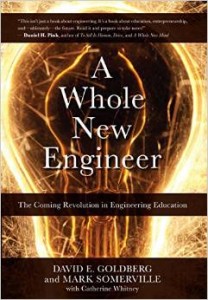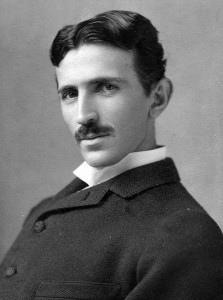Podcast: Play in new window | Download
Subscribe: Apple Podcasts |
 In a lively discussion of how to best prepare today’s engineering students for tomorrow’s engineering challenges, we talk with Dave Goldberg and Catherine Whitney about their new book, A Whole New Engineer.
In a lively discussion of how to best prepare today’s engineering students for tomorrow’s engineering challenges, we talk with Dave Goldberg and Catherine Whitney about their new book, A Whole New Engineer.
- Any “dot-com” dreams that Brian harbored during his college days have long since dissipated.
- Carmen suggests that ridiculous buyout amounts are now measured in units of “Instagrams,” with one Instagram equaling one billion US dollars.
- Engineers must constantly expand and refine their skills; Jeff notes that over his career he has moved from drawing prints on a drafting board, to working with 2D CAD packages, to implementing 3D models.
- Our first guest for this episode is Dave Goldberg, who appeared previously on Episode 37, in which he talked with us about the evolution of engineering roles over time. Dave leads ThreeJoy Associates, a consulting firm that advises educational institutions.
- Our second guest is Catherine Whitney, a New York-based writer who has previously written or co-written more than forty books on a wide range of topics, including nutrition, social issues, and entrepreneurial success.
- Dave argues that the “old engineer” was entirely appropriate in a time of expertise and narrow technical focus. However, a “new engineer” must reach across disciplinary boundaries, and solve problems in domains that lack recognized experts.
- Domenico Grasso has written about the importance of taking a holistic approach to engineering education and practice.
- Catherine mentions the myth of the “lone genius.”
- Dave makes a passing reference to disruptive innovation, a term coined by Clayton Christensen to describe the manner in which existing markets and institutions may be displaced through the introduction of new technologies.
- Current technological trends have led to people “bowling alone,” a phrase the describes how individuals are disengaging from the social and political networks that comprise local communities.
- Richard Feynman’s physics lectures are mentioned by Dave.
- The story of Jack Andraka is offered as an example of how academic expertise is being undermined over time.
- Jeff notes differences between “just-in-time” and “just-in-case” learning.
- Dave notes that more than one version of the Grinter Report (pdf) was proposed back in the mid-1950s.
- Our guests mention a study by Kristen Wolfe, later referenced by Woodie Flowers of MIT, that looked at the skills used by mechanical engineers five years after they graduated from college.
- Carmen references one of his favorite books, The Art and Science of Analog Circuit Design, by Jim Williams.
- An engineering leadership program at the University of Texas El-Paso is cited by Dave as an example of aspiration-specific education.
- Fernando Flores has written about the power of words in motivating action and establishing commitments.
- Dave was involved in establishing iFoundry at the University of Illinois, while co-author Mark Somerville was (and is) a faculty member at Olin College.
- References are made to Daniel Pink’s book Drive, and to Edward Deci’s work on intrinsic motivation (one example of which is his book Why We Do What We Do: Understanding Self-Motivation.
- A TED talk by Sugata Mitra describes how Indian children were able to teach themselves when provided nothing more than a computer.
- Harvard University’s Eric Mazur has championed the concept of peer instruction, in which college students teach one another.
- Dave introduces us to the concept of Junior Enterprise, a student-led consulting firm.
- In the coaching world, there exists the notion of polarity management, in which distinctions are made between problems and unsolvable paradoxes.
- Big Beacon is a social movement for transforming engineering education.
- More information about the book can be found at wholenewengineer.org.
- Catherine can be reached via email: catherinewhitney -=+ at +=- mac.com.
- Listeners can contact Dave via email: deg -=+ at +=- bigbeacon.org. He is also active on Twitter and Facebook.
- Finally, one can follow the happenings at Big Beacon via their website, on Twitter, or on Facebook.
Thanks to Dave Goldberg and Mark Somerville for use of their book cover image. Podcast theme music by Paul Stevenson.
Podcast: Play in new window | Download
Subscribe: Apple Podcasts |
 Guest David E. Goldberg talks with us about shifting expectations for engineers, and reveals the crucial skills needed by tomorrow’s engineering professionals.
Guest David E. Goldberg talks with us about shifting expectations for engineers, and reveals the crucial skills needed by tomorrow’s engineering professionals.
- Listening and questioning are important skills for today’s engineer, but these subjects are rarely addressed in the engineering curriculum.
- Our guest is David E. Goldberg, who is the Jerry S. Dobrovolny Distinguished Professor Emeritus at University of Illinois at Urbana-Champaign (UIUC), and the CEO of ThreeJoy Associates.
- Dave obtained an amateur radio license as a teenager, allowing him to communicate around the world via a Model 15 teletype machine.
- A day spent shadowing a city engineer led Dave to enroll in civil engineering.
- Despite his background in civil engineering, our guest wrote one of the leading references about genetic algorithms. His interest in artificial intelligence was sparked by the book, Gödel, Escher, Bach: An Eternal Golden Braid.
- In 2010, Dr. Goldberg resigned his tenure at UICU, and undertook training as a leadership coach at Georgetown University.
- Dave’s efforts with engineering reform started with iFoundry at UIUC. This project was influenced by the National Academy of Engineering report, The Engineer of 2020. Another influential report was Engineering for a Changing World, authored by James J. Duderstadt of the University of Michigan.
- Making changes to the engineering curriculum is difficult, as it induces a log-rolling problem among the faculty.
- In the late 1800’s, leading electrical engineers enjoyed a “rock star” status. This included luminaries such as Thomas Edison, George Westinghouse, and Nikola Tesla.
- It has been argued that technology and innovation are dominated by market-driven value judgments, rather than technical knowledge. This leads to engineering being a socially captive profession.
- The rise and fall of engineers as business leaders may have resulted as a conflict between bureaucratic loyalty and professional independence, as outlined in The Revolt of the Engineers, a book by Edwin Layton.
- Dave discusses the myth that science won World War II. Manufacturing engineers helped US factories and shipyards crank out planes, ships, and other war materiel, equaling the contributions of physicists.
- After the war, “physics envy” caused changes in the engineering curriculum, as advised by the Grinter Report, issued in 1955.
- While the pre-WWII engineering curriculum covered math and science at a fundamental level, the number of “hands-on” classes (drafting, shop, design, etc.) were far more prevalent than they are today.
- Looking forward, innovation seems to be a crucial skill for engineers, as suggested by the following books:
- When it comes to deciding whether software engineers are really “engineers,” Michael Davis of Illinois Institute of Technology (IIT) points to the lack of a accredited engineering degree as a reason for disqualifying programmers from claiming “engineering” status. Our guest makes no such distinction.
- Engineers need to move from being category “enhancers” to being category “creators.” Dr. Goldberg claims the primary difference between these functions is emotional, and not technical.
- Whereas engineers of the past needed to be obedient in enhancing marketplace offerings, tomorrow’s engineers must be courageous in “unleashing” their creative talents to invent novel products and services.
- Dave believes that engineering faculty must shift from an attitude of “I know” to “I trust” to successfully foster valiant young engineers.
- In his consulting work with ThreeJoy Associates, our guest works to transform the organizational, cultural, and emotional norms of institutions committed to engineering education.
- Big Beacon is a “social movement of the willing” formed to share best practices in reforming educational institutions. The project’s Twitter handle is @BigBeacon, and it has a Facebook page, as well.
- Slated for release in early 2014, Dave and co-author Mark Somerville are working on a new book, titled “A Whole New Engineer: A Surprising Emotional Journey.”
- Programs such as First Robotics and Project Lead the Way are having success in encouraging students to pursue engineering degrees.
- Unfortunately, students entering the engineering program are subjected to an math-science death march. Alternative rites of passage may be available for aspiring engineers.
- Coaching and collaborative skills may be useful for engineers who have completed a traditional engineering education. Google offers its employees a course on mindfullness.
- Dave can be reached by email as “deg” at “threejoy.com.” His Twitter handle is @deg511. He can be found on Facebook as deg511.
Thanks to Wikipedia Commons for the photograph of Nikola Tesla. Podcast theme music provided by Paul Stevenson
Practical insights for the engineering crowd
 In a lively discussion of how to best prepare today’s engineering students for tomorrow’s engineering challenges, we talk with Dave Goldberg and Catherine Whitney about their new book, A Whole New Engineer.
In a lively discussion of how to best prepare today’s engineering students for tomorrow’s engineering challenges, we talk with Dave Goldberg and Catherine Whitney about their new book, A Whole New Engineer.